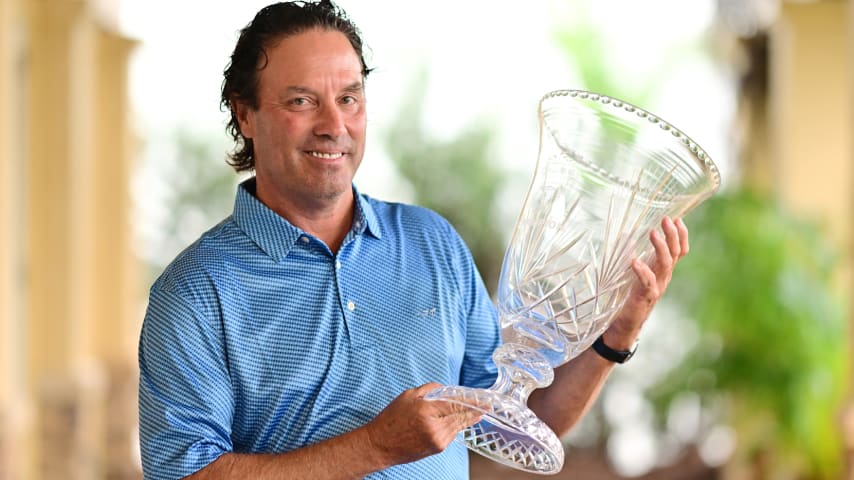A nine-hole PGA TOUR Champions finish? It didn't happen, but here's why it's possible
3 Min Read

NAPLES, FLORIDA - FEBRUARY 18: A view of rain falling on the course as the third round of the Chubb Classic was cancelled due to weather at Tiburon Golf Club on February 18, 2024 in Naples, Florida. (Photo by Julio Aguilar/Getty Images)
Written by Jeff Babineau
NAPLES, Fla. – Players finishing up their second rounds at the Chubb Classic on Saturday had mixed reactions when informed that, because of approaching rainstorms and a terrible Sunday forecast, the tournament’s final round was being shortened to nine holes.
A nine-hole finish? Huh? That news drew all sorts of reactions.
The angles of response ranged from historic – a majority of PGA TOUR Champions players had never played a 45-hole event, or competed in a nine-hole final day (“Be strange, I’m sure,” said Paul Broadhurst); to quite surprising (36-hole leader Stephen Ames questioned whether such a thing was in the Tour’s regulations); to downright excitement.
“The nine holes tomorrow,” said Rocco Mediate, who was three shots behind Ames, “is kind of cool, actually."
What also seemed a bit odd to players, at least initially, was seemingly random routing that was to be used. Sunday’s field, down to 76 players after a couple of withdrawals, would play holes 1-4 and then, instead of crossing Livingston Road (which bisects the golf course) to head to the fifth tee, finish with holes 14-18. Add them all up, and that’s nine holes.
Brian Claar, PGA TOUR Champions’ Vice President of Rules, Competition and Administration, brought some perspective to the thinking after play was called for good and the 36-hole tournament was made official first thing Sunday morning at Tiburón Golf Club, with Ames (13-under 131) declared the winner.

Stephen Ames’ Round 2 highlights from the Chubb Classic
Here is what, with the blessing of Chubb, Champions Tour officials were thinking:
“A two-tee start would be very difficult here, because the 10th tee is 3 miles away (from the clubhouse). There is no good way to get there,” Claar explained. “We figured if we kept everybody on this side of the bridge (that crosses Livingston), we could have a maintenance guy with a squeegee at every hole, and we could control a lot of the golf course.
“If the weather was such that we had breaks (when expected rains came down hard), and we had to suspend, we were only two minutes from the clubhouse, and we could get back out quickly.”
Players interviewed at Chubb could not recall any precedent that included a planned nine-hole finish. But as far as following the guidelines and regulations of PGA TOUR Champions, Claar said the tournament was fine to plan for such a finish, figuring 45 holes would provide a stronger measure of play than would 36.
Said Claar: “In the Rules of Golf, the definition of a ‘Round’ is 18 (holes) or fewer and the holes in order, set by the Committee. So, a lot of the players were saying, ‘Can you do this?’ And it was, ‘Absolutely, 100 percent.’”
A significant factor in postponing play early on Sunday was a half-inch of rain that fell overnight Saturday. With steady rains headed in from the gulf, expected to hover until mid-afternoon, it would not have been long before parts of the course were rendered unplayable. Also, had half the field played and finished, a Monday finish would be required.
Alas, the nine-hole sprint to the finish at Chubb never came to be, but it was a creative concept.
“We thought it was the best of both worlds about the best chance of playing more golf and getting at least 45 holes in,” Claar said. “It was a novel idea for sure, but well within the Rules of Golf. The tournament was all for it, and it made maintenance’s life easier, everyone’s life easier.
“It just didn’t work.”
It’s an outdoor game, after all, and Mother Nature can be a formidable foe.



